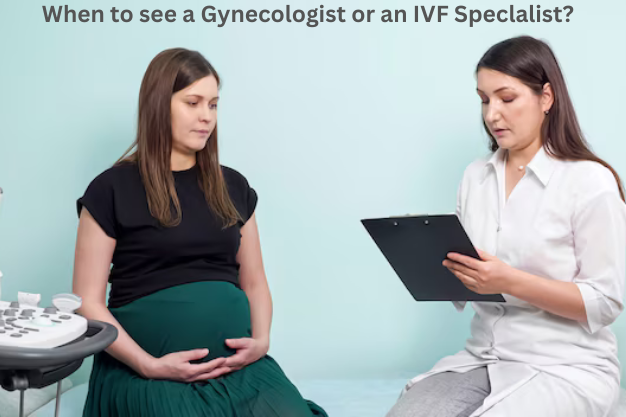When to see a Gynecologist or an IVF Specialist?
When it comes to fertility and reproductive health, knowing when to consult the right medical professional is crucial. Whether you're dealing with specific gynecological issues or considering fertility treatments like IVF, seeking timely guidance can make a significant difference in your overall health and success in achieving pregnancy. Here’s when you should consult a gynecologist or an IVF specialist.
When to See a Gynecologist
A gynecologist is a healthcare professional specializing in women's reproductive health. You should consider consulting a gynecologist in the following situations:
Irregular Periods: If your menstrual cycle is irregular, heavy, or painful, it's essential to consult a gynecologist.
Pelvic Pain: Persistent pelvic pain can be a sign of underlying issues, such as endometriosis or pelvic inflammatory disease.
Abnormal Vaginal Discharge: Any unusual vaginal discharge, such as a change in color, odor, or consistency, should be evaluated by a gynecologist.
Painful Intercourse: Pain during intercourse can be a symptom of underlying conditions like endometriosis or pelvic adhesions.
Difficulty Conceiveing: If you and your partner have been trying to conceive for over a year without success, it's advisable to consult a gynecologist.
Preconception Counseling: If you're planning to start a family, a gynecologist can provide valuable advice on preconception health, including vaccinations, nutritional counseling, and lifestyle modifications.
Menopause Symptoms: If you're experiencing symptoms of menopause, such as hot flashes, night sweats, or mood swings, a gynecologist can offer guidance and treatment options.
When to See an IVF Specialist
An IVF specialist is a fertility expert who specializes in diagnosing and treating infertility. You should consider consulting an IVF specialist if:
- You and your partner have been trying to conceive for over a year without success.
- You've been diagnosed with a fertility condition, such as endometriosis, PCOS, or male factor infertility.
- You've had multiple miscarriages.
- You're over 35 years old and concerned about age-related fertility decline.
- You have a history of pelvic inflammatory disease or other reproductive health issues.
New World Fertility Centre, Delhi: Your Partner in Fertility
At New World Fertility Centre, Delhi, our experienced fertility specialists are dedicated to helping you achieve your dream of parenthood. We offer a comprehensive range of fertility services, including:
Advanced Fertility Treatments: We utilize state-of-the-art techniques, such as IVF, ICSI, and PGD.
Personalized Treatment Plans: Our specialists tailor treatment plans to your individual needs.
Emotional Support: We provide emotional support and counseling to help you navigate the challenges of infertility.
Conclusion
Choosing the right time to see a gynecologist or an IVF specialist can greatly impact your chances of successful conception. If you are experiencing any issues with menstruation, fertility, or pregnancy, don't hesitate to consult with a healthcare professional. Early intervention can prevent further complications and offer you the best chance at achieving your family-building goals.
Frequently Asked Questions (FAQs)
1. When should I see a gynecologist for fertility concerns?
If you're experiencing irregular periods, painful menstruation, or if you’ve been trying to conceive for over a year without success (or 6 months if you're over 35), it’s time to see a gynecologist. They will evaluate your reproductive health and suggest the appropriate next steps, which may include testing for conditions like PCOS, endometriosis, or hormonal imbalances.
2. What are the signs that I should see an IVF specialist?
If you've been trying to conceive for more than a year without success, or if you’ve had multiple miscarriages, an IVF specialist should be consulted. They can diagnose underlying infertility issues and offer treatments like IVF, ICSI, or genetic screening to increase your chances of conception. IVF is also recommended if you're over 35 and have difficulty getting pregnant after six months of trying.
3. Is it necessary to see both a gynecologist and an IVF specialist?
In many cases, yes. A gynecologist can evaluate your overall reproductive health, diagnose any gynecological conditions, and treat basic fertility issues. If assisted reproductive treatments like IVF are needed, your gynecologist will refer you to an IVF specialist, who will provide specialized care and advanced fertility treatments.
4. When should I consult an IVF specialist if I have a medical condition?
If you have underlying medical conditions like thyroid disorders, diabetes, or obesity that may affect fertility, it’s important to consult with both a gynecologist and an IVF specialist. The gynecologist can manage the medical aspects of your health, while the IVF specialist can provide options for fertility treatment.
5. How can I tell if I need IVF treatment?
If basic fertility treatments like ovulation induction or IUI have not been successful, IVF may be the next step. Your gynecologist may refer you to an IVF specialist if they determine that assisted reproductive technologies are needed to help you conceive. IVF is especially useful for women over 35, those with blocked fallopian tubes, male factor infertility, or unexplained infertility.

 Dec-03-2025
Dec-03-2025